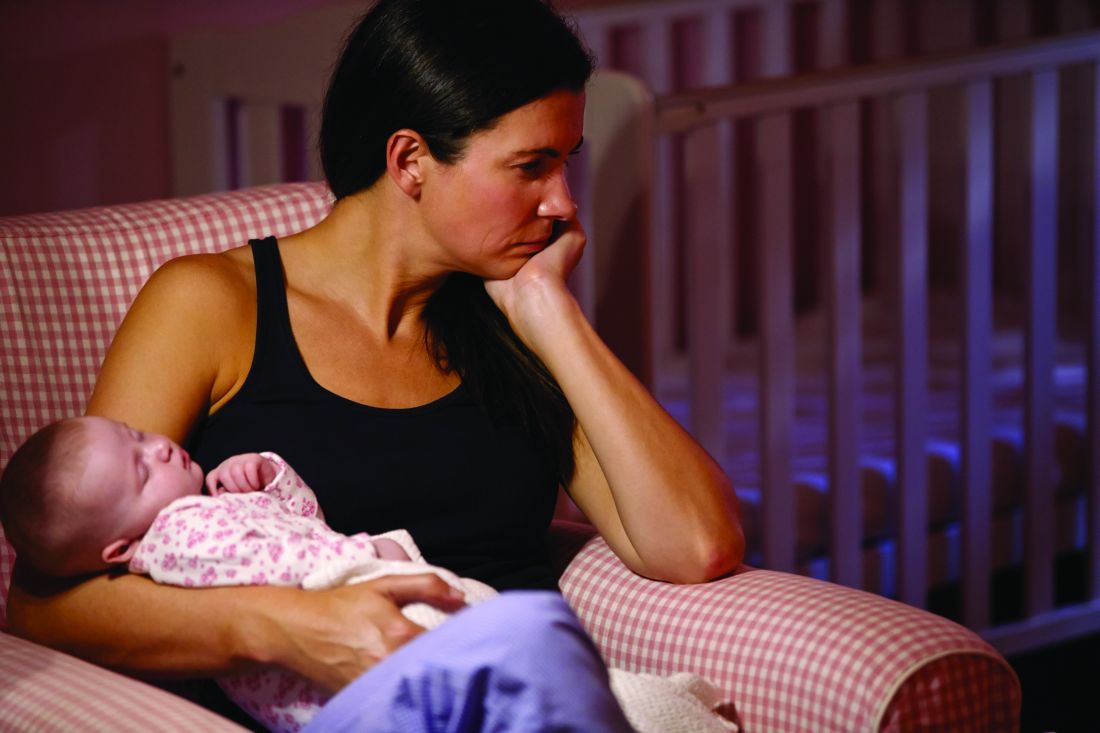User login
Women with a history of depression have a risk of postpartum depression that is more than 20 times greater than women without such a history, according to Michael E. Silverman, PhD, and his associates. In addition, pre- and perinatal risk factors also raise the postpartum depression risk, they reported.
In a nationwide prospective cohort study, Dr. Silverman and his associates identified 707,701 women with live singleton births in Sweden from 1997-2008. Results showed that, compared with women without a history of depression, there was a statistically increased risk for postpartum depression in women with a history of depression (relative risk, 21.03; 95% confidence interval, 19.72-22.42).
Pregnancy length and depression history also proved significant in the mothers’ development of postpartum depression. The risk of postpartum depression, for example, was higher among women with a history of depression who gave birth before week 32 (RR, 1.12; 95% CI, 0.73-1.74), compared with women who gave birth before the 32nd week without a depression history (RR, 1.53; 95% CI, 1.12-2.10).
The existence of diabetic disease was another significant factor. Among women with gestational diabetes with a history of depression, the risk of postpartum depression was slightly higher (RR, 1.69; 95% CI, 1.18-2.43) than it was for women in that group without a depression history (RR, 1.67; 95% CI, 1.25-2.23). The differences were more dramatic among women with pregestational diabetes. Those with pregestational diabetes with a history of depression had a far greater risk of developing postpartum depression (RR, 1.49; 95% CI, 1.01-2.21) than did women with pregestational diabetes without a history of depression (RR, 1.16; 95% CI, 0.73-1.83), reported Dr. Silverman, of the department of psychiatry at the Icahn Medicine at Mount Sinai, New York, and his associates.
“For the first time, we show how maternal and obstetric risk factors for [postpartum depression] may differ between new mothers with and without a history of depression,” the investigators wrote. “Never shown before, some of the risks associated with obstetric and perinatal factors are modified by a history of depression, suggesting differences in the etiology of [postpartum depression] between women with and without a personal history of depression.”
Read the full study in Depression and Anxiety (doi: 10.1002/da.22597).
Women with a history of depression have a risk of postpartum depression that is more than 20 times greater than women without such a history, according to Michael E. Silverman, PhD, and his associates. In addition, pre- and perinatal risk factors also raise the postpartum depression risk, they reported.
In a nationwide prospective cohort study, Dr. Silverman and his associates identified 707,701 women with live singleton births in Sweden from 1997-2008. Results showed that, compared with women without a history of depression, there was a statistically increased risk for postpartum depression in women with a history of depression (relative risk, 21.03; 95% confidence interval, 19.72-22.42).
Pregnancy length and depression history also proved significant in the mothers’ development of postpartum depression. The risk of postpartum depression, for example, was higher among women with a history of depression who gave birth before week 32 (RR, 1.12; 95% CI, 0.73-1.74), compared with women who gave birth before the 32nd week without a depression history (RR, 1.53; 95% CI, 1.12-2.10).
The existence of diabetic disease was another significant factor. Among women with gestational diabetes with a history of depression, the risk of postpartum depression was slightly higher (RR, 1.69; 95% CI, 1.18-2.43) than it was for women in that group without a depression history (RR, 1.67; 95% CI, 1.25-2.23). The differences were more dramatic among women with pregestational diabetes. Those with pregestational diabetes with a history of depression had a far greater risk of developing postpartum depression (RR, 1.49; 95% CI, 1.01-2.21) than did women with pregestational diabetes without a history of depression (RR, 1.16; 95% CI, 0.73-1.83), reported Dr. Silverman, of the department of psychiatry at the Icahn Medicine at Mount Sinai, New York, and his associates.
“For the first time, we show how maternal and obstetric risk factors for [postpartum depression] may differ between new mothers with and without a history of depression,” the investigators wrote. “Never shown before, some of the risks associated with obstetric and perinatal factors are modified by a history of depression, suggesting differences in the etiology of [postpartum depression] between women with and without a personal history of depression.”
Read the full study in Depression and Anxiety (doi: 10.1002/da.22597).
Women with a history of depression have a risk of postpartum depression that is more than 20 times greater than women without such a history, according to Michael E. Silverman, PhD, and his associates. In addition, pre- and perinatal risk factors also raise the postpartum depression risk, they reported.
In a nationwide prospective cohort study, Dr. Silverman and his associates identified 707,701 women with live singleton births in Sweden from 1997-2008. Results showed that, compared with women without a history of depression, there was a statistically increased risk for postpartum depression in women with a history of depression (relative risk, 21.03; 95% confidence interval, 19.72-22.42).
Pregnancy length and depression history also proved significant in the mothers’ development of postpartum depression. The risk of postpartum depression, for example, was higher among women with a history of depression who gave birth before week 32 (RR, 1.12; 95% CI, 0.73-1.74), compared with women who gave birth before the 32nd week without a depression history (RR, 1.53; 95% CI, 1.12-2.10).
The existence of diabetic disease was another significant factor. Among women with gestational diabetes with a history of depression, the risk of postpartum depression was slightly higher (RR, 1.69; 95% CI, 1.18-2.43) than it was for women in that group without a depression history (RR, 1.67; 95% CI, 1.25-2.23). The differences were more dramatic among women with pregestational diabetes. Those with pregestational diabetes with a history of depression had a far greater risk of developing postpartum depression (RR, 1.49; 95% CI, 1.01-2.21) than did women with pregestational diabetes without a history of depression (RR, 1.16; 95% CI, 0.73-1.83), reported Dr. Silverman, of the department of psychiatry at the Icahn Medicine at Mount Sinai, New York, and his associates.
“For the first time, we show how maternal and obstetric risk factors for [postpartum depression] may differ between new mothers with and without a history of depression,” the investigators wrote. “Never shown before, some of the risks associated with obstetric and perinatal factors are modified by a history of depression, suggesting differences in the etiology of [postpartum depression] between women with and without a personal history of depression.”
Read the full study in Depression and Anxiety (doi: 10.1002/da.22597).
FROM DEPRESSION AND ANXIETY

